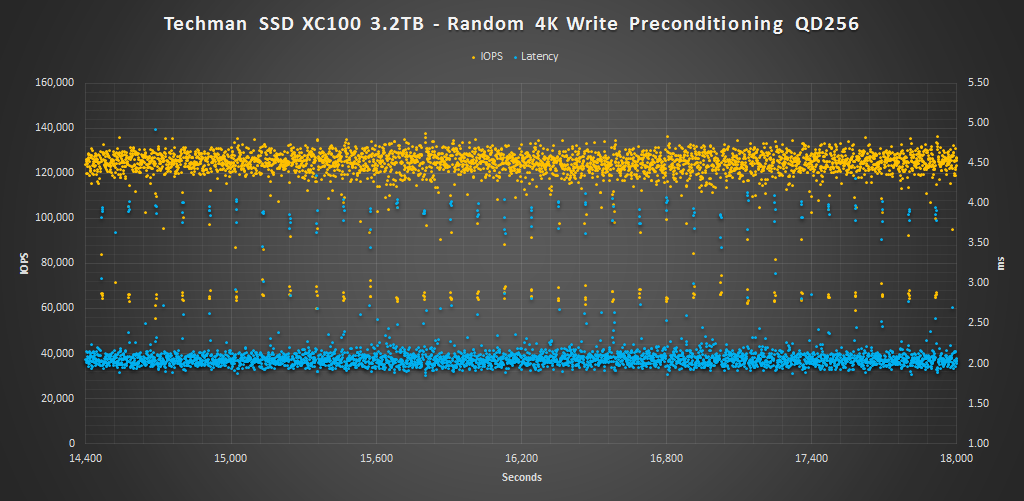4KB RANDOM READ/WRITE
In order to properly test random 4KB performance we first secure erase to get it in a clean state. Next, the drive is filled by sequentially writing to the RAW NAND capacity twice. We then precondition the drive with 4KB random writes at QD256 until the drive is in a steady state. Finally, we cycle through QD1-256 for 5 minutes each for writes and then reads. All this is scripted to run with no breaks in between. The last hour of preconditioning, the average IOPS, and average latency for each QD is graphed below.
With this closer look at our preconditioning data, we see while the average 4K write latency at QD256 is about 2.1ms and the average IOPS is 125K. What sticks out like a sore thumb, however, is that there are many outliers which are approximately half the performance of the bulk average. While latency ranges mainly from about 1.9ms to 2.2ms, many of the outliers reach 4ms. The IOPS results reflect this with performance that, while averages well, drops to nearly 60K IOPS over intervals.

 During 4K reads we can see that the XC100 is very competitive to that of the HGST SN100 and also leaves the Intel DC P3700 in the dust. It reaches 739K IOPS at QD 256 while showing a very similar exponential increase in speed as the QD increases. Latency results are very good with values under 0.2ms up to QD128.
During 4K reads we can see that the XC100 is very competitive to that of the HGST SN100 and also leaves the Intel DC P3700 in the dust. It reaches 739K IOPS at QD 256 while showing a very similar exponential increase in speed as the QD increases. Latency results are very good with values under 0.2ms up to QD128.


Looking at the above results now we can see that the Techman XC100 achieved its 115K IOPS write specification with ease. At QD8 it reached nearly 120K IOPs and maintained that speed all the way through to QD256. Latency remains under 1ms until QD128 and reaches just over 2ms during QD256. Comparing its performance to the other SSDs, however, we can see that they are better equipped for 4K writes than it is.
 The SSD Review The Worlds Dedicated SSD Education and Review Resource |
The SSD Review The Worlds Dedicated SSD Education and Review Resource | 
